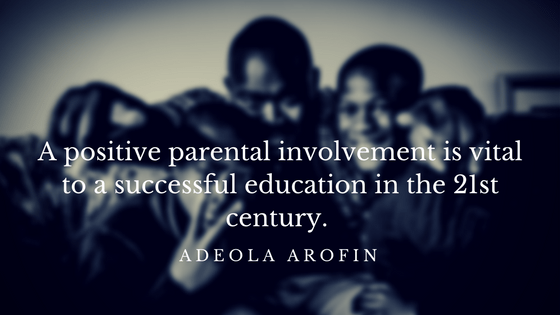In this day and age, with everyone working hard to make a decent living, it is not surprising that some parents do not want the additional stress of supporting their child’s education at home, particularly if they are paying so much for their schooling. Indeed, between leaving home at the crack of dawn to beat traffic, and coming home after lights out for the children, not to mention the regular working weekends, where are parents meant to find the time or the energy to provide good quality support? Hence the growing popularity of the Home Tutor. While it may not be a bad idea to employ someone to tutor children, especially older ones who are struggling, this cannot in any way replace the powerful impact of that personal touch from the parent. The word positive is used in the opening sentence because it is important that the parent involvement models a strong mutually trusting and respectful relationship for the children to emulate. Believe it or not, children are extremely good at reading meaning into both verbal and non-verbal cues. And often, they can see through any pretence of genuine interest.
Here are five key ways a positive parental involvement is beneficial to a successful education:
- Children learn best when they are emotionally vested in the learning process. In other words, when they feel strongly about what and how they are learning. Who better to make the learning process worthwhile than their cherished parents? Parents can help them foster a love of learning by helping them make those connections between the content in the curriculum and their lives outside of school. This will also help add more context to what they are learning, thus making it more relevant to them.
- Parents are in a good position to give feedback to teachers at school, especially when a child is not able to cope independently with given assignments. Whereas a lesson teacher will over-guide or over-support, a parent can let the teacher know the difficulty faced in getting the work done.
- Modelling the collaborative effort is a very good way to teach children that important 21st-century skill employers are now placing so much emphasis on- the skill to collaborate and work in a team towards a common goal.
- The journey is as important as the destination. It is good to know how a child is doing as he or she proceeds through the term, so parents can step up support or step up collaboration with the teacher. This way, many issues may be nipped in the bud before they become entrenched.
- An ongoing productive dialogue about school at home has been shown to actually improve parent-child relationships within the context of the family, and by extension, produce significantly improved language skills, improved test performance, and improved overall school behaviour.
So it’s a win-win situation! School wins, home wins and most importantly, the child’s education gets a boost. To keep the parent-school relationship positive, schools should ensure up to date information about the school’s plans for the ongoing education of the children, and that the progress the children make, reaches parents regularly. Provisions should also be made for opportunities for collaboration between the parent and the key staff in charge of educating the children at each stage. Parents should encourage their child’s teachers by supporting classroom and school programmes as best they can. They may also strengthen the trusting relationship by placing importance on feedback from teachers and offering their own insights, as the foremost experts on their children.
Parents will be pleasantly surprised to discover that positive parent involvement actually does not have to take that much of their time. What it does need is a genuine interest in the process and not the end product alone. What this means is that parents should not wait to see the results, but be fully engaged with their child on that journey towards the end results. For the busy parent, here are eight tips to ensure a strong parent involvement in the education process:
- Attend parent-teacher conferences. If you are unable to be there at the appointed time, make an effort to book another appointment for a brief chat with your child’s teacher.
- Have a family school diary. If you leave home before they wake up, and get back after lights out, have a nice diary where everyone enters their highpoint and low point each day. Younger children may draw pictures of their day. This way, they will sharpen their recall skills while giving parents an overview of their experiences that day. Older children, especially those preparing for exams, could have a summary book where they write a summary of content treated in each subject taken that day. Parents may then schedule a time where they can put their feet up and catch up by reading through the week’s events. A series of follow up questions for your child will show him or her that you have read through and are interested.
- The importance of modelling cannot be overemphasised. It is important for children to see parents reading, and focusing on a task in order to meet deadlines, paying attention to detail and putting their best foot forward in areas like presentation and re-checking of work done. Working parents should talk about the importance of doing their work and doing it well in order to excel within their workplace, and in life in general. Stay at home parents should do the same, demonstrating good work ethic even by the way they take good care of the home.
- As mentioned earlier, the end result alone cannot be the only area of interest for parents. Therefore, praise and reward for effort on the journey. Pay close attention to what the teacher tells you from school, and if information is not readily available, ask for an update on effort level at school.
- Support your child’s teacher by maintaining a regular dialogue with him or her via email. Give the teacher insider information about what helps your child to learn and what puts your child off learning. This is particularly important at the beginning of a new school year when teachers and children are just getting to know one another.
- Television and the Internet have very large spheres of influence. At one end of the continuum of influence, the best end, there is a wealth of knowledge that can be put to good use. At the other end, the worst end, there is a lot that could challenge the values parents and schools work hard to instil in children. Children are naturally inquisitive and most will reach as far as they are permitted to when it comes to finding out about the world they live in, so parents must closely monitor what their children are exposed to in this regard, by installing safeguards to censure television programmes and websites.
- Encourage active learning. Children must be encouraged to consistently ask and answer questions, both at home and at school. When children are encouraged in this way at home, it will translate to more participation in school as well. Active learning, as opposed to quiet learning, also involves ensuring your child is involved in all aspects of school life, from sports to cultural and creative arts, as well as all co-curricular events. Parents should enable their children to embrace the educational experience in its entirety.
- The tendency is for older children to try and give up on sleep to pack in some extra reading. But this can be counter-intuitive. A good night’s sleep is much more effective than cramming. Scientific research supports this. Studies show that students who have not had a good night’s sleep are more likely to struggle in tests the following day. Study after study has also proven that sleep improves one’s general state of health and immunity, increases one’s pain threshold, significantly lowers the risk of injury, improves one’s mood, aids clear thinking and improves one’s memory. All of these are very helpful in a child’s educational experience. So parents should ensure a good night’s sleep each night.
What works well for you in support of your child’s education?


